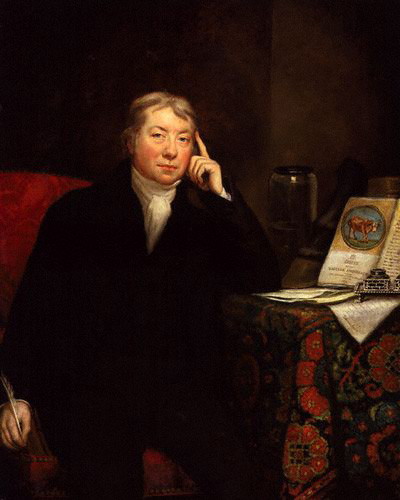| Edward Jenner | |
|---|---|
 |
|
| Physician & Scientist | |
| Specialty: | Microbiology |
| Born | May 17, 1749 Berkeley, Gloucestershire |
| Died | Jan. 26, 1823 (at age 73) Berkeley, Gloucestershire |
| Nationality | English |
Edward Jenner was an English scientist and physician. He is best known for having pioneered the field of immunology after developing the first smallpox vaccine. He was also a noted naturalist, publishing detailed accounts of the life of the cuckoo. A number of buildings and monuments are named in his honor.
Jenner’s work eventually led to the official eradication of smallpox, announced by the World Health Organization in 1979. He was also the coiner of the words “vaccination” and “virus.”
Jenner’s Early Life
Jenner was born into a church family on May 17, 1749, in the English village of Berkeley. His parents were both dead by the time the boy was five, so his older brother took on the role of raising him. Jenner was educated in the small Gloucestershire town of Wootton-under-Edge. When he became 13 he became the apprentice of a surgeon.
After his period of apprenticeship ended in 1770, he went to London to work with the renowned Scottish surgeon John Hunter. It was he who encouraged an experimental, curious approach to medicine in the young man. In 1773, Jenner returned to Berkeley and started his own medical practice.
The Problem of Smallpox
At this time, smallpox was a serious problem in Britain and elsewhere. Many approaches to treatment had been attempted, and both the Chinese and the Turks had independently discovered that a person who had suffered only a mild case of smallpox would be immune from ever catching the disease again.
Inoculation, as the practice of deliberately injecting smallpox for this reason was called, was the primary means of protection against smallpox in the 18th century, but it was extremely dangerous as it could not be predicted in advance how severe the disease would be in any particular person; many died, or were terribly disfigured from the after-effects of the large scabs that formed.
Smallpox and Cowpox
While working in his role as a country physician, Jenner realized that dairy workers who had had cowpox were apparently immune to smallpox. Since cowpox was highly reminiscent of a mild case of smallpox in its symptoms, Jenner wondered whether the two might be connected.
He formulated a theory that the deliberate provocation of cowpox might be a safer method of protecting against smallpox than simple inoculation. However, the medical establishment of the day was unreceptive and suspicious of the whole idea. Jenner pushed to bring vaccination with cowpox from a local superstition to an accepted medical practice.
Experimenting with Cowpox
After spending more than 20 years studying cowpox and smallpox cases, Jenner was ready to proceed with a step that, if it failed, might see him branded a criminal. In 1796, he took a sample from a dairy maid who had cowpox and injected into a local boy, James Phipps.
Six weeks later, he took the hugely risky step of injecting the same boy with smallpox. Had he become ill with the more serious disease, Jenner would have been at best vilified and at worst, arrested for murder. However, the boy remained healthy, and Jenner’s new method – which he called vaccination – had been justified.
Publishing His Findings
Jenner quickly published a paper about his findings, which became hugely sought after all over Europe. Within two years, 12,000 people in England had been vaccinated and smallpox deaths had fallen by two-thirds. Demand for vaccination grew, and by 1800 more than 100,000 people all over the world had received the new miracle injection. Jenner realized that it was possible to dry lymph fluid from a smallpox pustule and keep it in dried form for several months, allowing for easier transportation. This in turn allowed patients to be treated much more easily, even in remote and outlying districts.
Jenner’s Honors and Legacy
Jenner became one of the most popular and respected men in the western world for his work. In 1804, Napoleon Bonaparte agreed to a request Jenner made for the release of a number of Englishmen, despite the fact that the two nations were at war. In the United States, Thomas Jefferson vaccinated his family at Monticello with material he had been sent by Jenner.
Despite his fame, however, the medical establishment in Jenner’s home country denied him entry into London’s College of Physicians unless he first took an exam on Galenic and Hippocratic theory. Jenner refused, stating that his work was his qualification, and he was never elected a college member.
As well as his work in medicine, Jenner was interested in the natural world. He had been a Fellow of the Royal Society since 1788, on account of a thorough and detailed study of the life of the cuckoo in the nest, and now he spent a considerable amount of time collecting fossils, as well as tending to his plants.
Jenner died of tuberculosis on January 26, 1823. By the time of his death, vaccination was firmly established as the best method of preventing smallpox, and it was later extended to many other viral diseases. Thanks to his pioneering work, Jenner is sometimes considered to have saved more people by his scientific endeavors than anyone else in history.